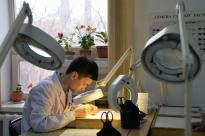In developing countries, innovation can address most of the challenges facing agriculture and natural resources management. Many developing countries, however, don’t have sufficient resources to properly develop their capacity to innovate. More specifically, the activities of agricultural research institutions are often affected by scarce investments and poor financial management, as well as limitations in technology transfer strategies. Similarly, extension systems are often under-resourced and not sufficiently coordinated and use outdated approaches and methods.
FAO aims to address this gap by contributing to transform agricultural innovation systems (AIS) of its member countries. By AIS is meant all the individuals, organizations and enterprises that bring new products, processes and forms of organization into use to achieve food security, economic development and sustainable natural resource management.
- Introduction to the webinar Selvaraju Ramasamy, FAO Senior Agricultural Officer & Head of Research and Extension Unit, OINR
- Digital delivery of advice: experiences and lessons
learned from the AGRILINK project
Pierre Labarthe, Horizon 2020 AGRILINK Project Co-ordinator, INRAE, France
The goal of AgriLink – Agricultural Knowledge: Linking farmers, advisors and researchers to boost innovation, is to stimulate transitions towards more sustainable European agriculture by furthering the understanding of the roles played by a wide range of advisory organisations in farmer decision-making and enhancing their contribution to learning and innovation.
Session 1: Role of advisory systems and related policies in maximizing digital dividends and minimizing digital divides
- Setting the scene: Synthesis of the preparatory e discussion Mark Redman, Horizon 2020 AGRILINKProject, HCC, Romania
Panel discussion based on concrete country cases:
- Promoting collaborative use of a Pest Monitoring & Warning System, INTIA, Spain
- COVID-19 impact on digital delivery of extension and advisory services, Ms. Nevena Alexandrova Stefanova, FAO OINR
- Farmer needs assessments, Ms. Monica Kansiime, CABI Africa Pierre Labarthe, Horizon 2020 AGRILINK Project Co-ordinator, INRAE, France
Session 2: Empowerment of smallholder farmers and policy recommendations
- Setting the scene: policy recommendations for farmer training and educations on digital literacy Puyun Yang, OINR Unit, FAO
- Assessing rural youth digital access, use and skills as a basis for online engagements and co-design of digital services Marzia Pafumi, ESP Division, FAO
Panel discussion based on concrete country cases:
- Daniel Ninsiima, Executive Director, e-Omulimisa, Uganda
- Ms. Su Kahumbu, CEO, iCow, Kenya
- Ms. Xin Yi Lim, Executive Director, Sustainability and Agricultural Impact, Pinduoduo, China
- Ms. Gunn-Turid Kvam, Facilitating better connection between small farmers & digital suppliers, RURALIS, Norway
- Ms. Nevena Alexandrova-Stefanova, FAO OINR
Synthesis and closing observations
Gianluca Brunori, Horizon 2020 AGRILINK Project + DeSIRA
Project, University of Pisa, Italy



No comments:
Post a Comment